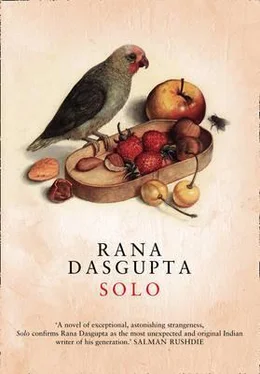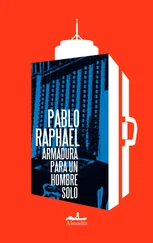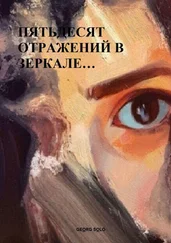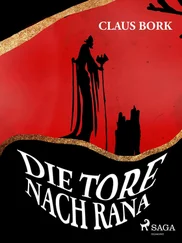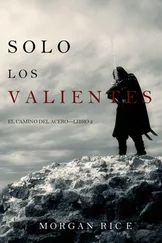He was unable to make hinges for the glasses, and he could not find out where to buy them. He was therefore obliged to go to the market and buy another pair of sunglasses to take the hinges from. That pair cost four leva. Over the years he had invested hundreds, if not thousands, of leva in his own production.
The police took years to return, but when they did they asked no questions. They simply dismantled his laboratory so that he could not continue his work any more.
26
TODAY, ULRICH’S NEIGHBOUR is preoccupied by the recent arrival of two more Gypsy families in the building.
‘They’re taking over,’ she says as she unloads Ulrich’s laundry. ‘These days I’m scared to come home after dark. Their young men stare at me while I walk to the lift.’
She has brought hot sausages, which Ulrich can smell. She puts a new packet of tea bags in the cupboard, and disappears into the bathroom with toilet paper.
In this weather, everything is storing heat. When there is absolute quiet, Ulrich can hear the wood of the window frame creaking with desiccation.
He hears his neighbour tidying up in the bathroom. She flushes the toilet.
‘You know they steal the electricity?’ she says, emerging again. ‘Their children are electrical wizards: they disconnect their meters and connect their supply to the meters of hard-working Bulgarians. That’s why our bills have been rising so much. The Gypsies don’t pay one stotinka. They spend it all on dancing and weddings. And if you try and confront them …’
She leaves Ulrich to picture the consequences. He feels he should show more concern, since she also pays his own electricity bill, but he can think of nothing to say.
‘You’d think they’d become more civilised, living among Bulgarians. But it’s quite the opposite! They have marble floors and satellite dishes, they mint money like the National Bank — and still they steal from us!’
And with a sigh she said,
‘God save Bulgaria!’
Ulrich has his own pet hatred. There is a man on the ground floor who collects bits of old wood and iron, covers them in gold spray paint, and sells them. He picks up a rusty plaque with a lion on it, or a wreath, he sands the rust off and sprays it gold, and sells it to someone for their house. This building has a small garden, which at present is full of the man’s junk, though Ulrich is certain that no one gave him the liberty to store it there. On windy days he applies his spray paint inside, in the hallway, and the entire building smells of acetone.
These proceedings incite inexplicable fury in Ulrich. His mind dwells on this man for much longer than it should, and whenever his neighbour is counting out his pills, he asks whether she has news of him, to feed his irritation.
In the extreme of his life, Ulrich’s emotions have begun to pitch and toss on their own, with no proportion to what caused them. He no longer laughs at jokes, or weeps at things that are sad, but he finds himself weeping and laughing at other times, for no obvious reason. Nothing flows when expected, and then an entirely simple thing — the sun on his face in the morning, or the feel of a spoon in the hand — punctures an escape route, and a torrent bubbles out, erotic and sickly, of grief, or anger, or mirth.
Earlier today, the excited voice of a football commentator activated in Ulrich a sharp happiness that seemed to have been laid down decades ago, and never felt.
Ulrich has come to enjoy this unpredictability of his emotions. He feels as if something new is happening to him, even at his age.
‘You know what we found in the flooded apartment upstairs?’ his neighbour says as she opens the door. ‘Beetles.’
Ulrich nods, imagining the scene. But that is not what she meant.
‘He had them on the wall, in wooden cases. Must have been at least twenty wooden frames full of different beetles. Beautiful things, they were: iridescent green, some of them as big as your fist. There was nothing else in the house: the place was emptied out. A radiator pipe had burst, that’s why we had all that water, and the floor was completely rotten. Don’t know who’s going to pay for the repairs. My husband’s going to see if he can get some money for those beetles, but that won’t begin to cover it.’
Ulrich asks if the owner of the flat was an entomologist.
‘I don’t know,’ she says hurriedly. ‘I never met him. But I have to get home and take the weight off these legs. They’re killing me.’
Ulrich takes the opportunity to ask what exactly is wrong with her legs.
She blows out her air.
‘There’s nothing wrong with my legs, as such. I don’t have any. Didn’t you ever notice? I lost them years back.’
Ulrich does not feel he can ask how it happened, since she has not volunteered it. She shuts the door, and he hears her limping hurriedly along the corridor. He feels a little guilty that he takes her so for granted.
It is the most beautiful moment in the day, and though Ulrich can no longer see it, he has lived in this room for long enough to sense when it is beginning. In the middle of the morning, the sun shines through his window on to the mirror, and the room glows joyfully for a few minutes with the travelling rectangle of light on the opposite wall. Even without his eyes, he feels the momentary transfiguration.
27
RELEASED FROM HIS OWN CHEMISTRY, Ulrich realised Bulgaria had become a chemical disaster. The rivers ran with mercury and lead, and hummed with radioactivity. Fishing had dried up on the Black Sea coast, and, every year, more fields and forests were lost.
The Kremikovtsi steelworks and the Bukhovo uranium mine flooded Sofia with lead, sulphur dioxide, hydrogen sulphide, ethanol and mercury. Radioactive sludge from Bukhovo was dumped in an open forest, contaminating the river and the surrounding land.
The copper mines in Pirdop devastated everything around them. Arsenic flowed straight into the Pirdopska river, and dead fish piled up downstream in enormous stinking banks. Nylon stockings melted on contact with the air.
Bulgarian sheep had miscarriages and died, and the cows went mad. Children were born with cancers and deformities. Like all his compatriots, Ulrich had become chemical himself, his blood a solution of cadmium, lead, zinc and copper.
Reactor 4 of the nuclear power plant in Chernobyl blew up, and the atmosphere altered. The undead leaders clung to office and alcohol, but they had lost the power to stop talk. Intellectuals began to denounce the chlorine pollution from the chemical plant across the river in Romania, which poisoned the Rousse air. They criticised industry and the socialist ideal. They made films against chemical contamination, and demonstrated in the streets. They spoke with impunity, and it was clear that Zhivkov had lost his mastery.
The Turks protested the treatment they had received: their ghettos, their labour, the forced change of their names. The old factories churned but the shops were empty, and even a child could see that the eternal system was propped up now only by rust and contraband. The lording Gypsies worked in trucks and trains, and made money moving things from here to there. People said it rained banknotes at their weddings.
The forbidden music returned.
Ulrich watched his television, not really understanding what was going on. People said, Communism is no more! and, after forty years, Zhivkov stepped down from his height, and became subject to human things. His arrest and trial were shown to the world. He sweated in the courtroom, he was nervous and made mistakes, and it was impossible any more to believe in his divinity. Secrets were laid bare, and everything collapsed like a public demolition.
Читать дальше
Конец ознакомительного отрывка
Купить книгу
